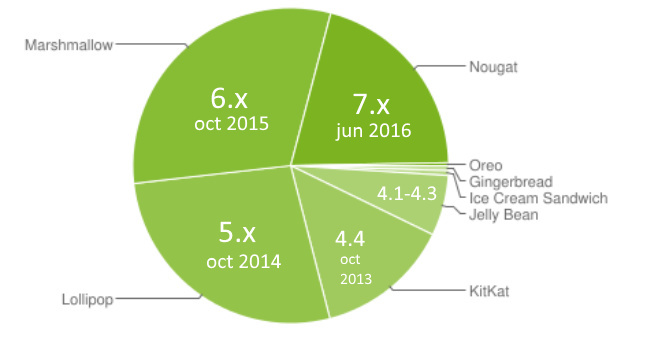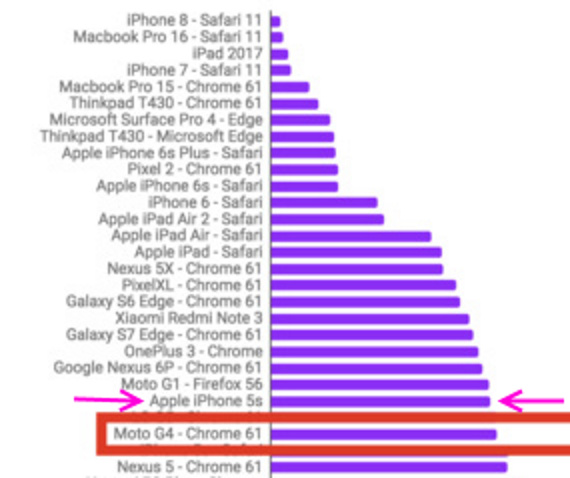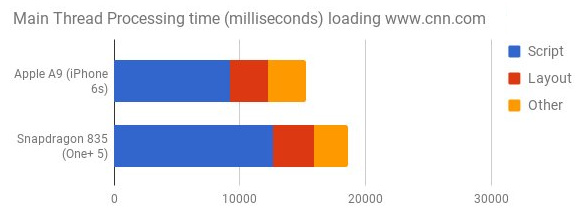Yeah, I don’t know where you’d get access to that data. Someone like Google might have it.
For what it’s worth, I don’t think I’ve ever had a cell phone for less than three years before replacing.
Back when they subsidized phones, I upgraded every 2 years to get the subsidy. These days I’ll get a new one every year if it’s sexy. So, not the iPhone 7. But I’m hardly typical, in so many ways.
The Internet delivers! Android OS versions in the wild as of October:
Weighted heavily toward Android 5-6—Marshmallow and Lollipop account for more than half of the Android market. Phones with those are going to be a few years out of date by nature. As far as iPhones go, as of April 2017:
The iPhone 6 constellation again accounts for more than 50% of extant iPhones.
Ah, I didn’t think about measuring it by Android version… smart.
we have a guy connecting to work email on android 5. he won’t upgrade his asus zenfone 2 because the last version of android they have 6.01 takes away multi user mode he claims. blacklisted his device for being out of date.
Perhaps the double-buried super secret lede is that most websites are delivering bloated, awful, framework-happy JavaScript. These “developers” then pitch a screeching hissy fit when Moore’s Law fails to step up and cover for their laziness and/or incompetence.
The same complaints about Javascript reminded me of the days when the C guys complained about Java. And when the assembly guys complained about C.
Yeah, 640kb should be enough for everyone, if you really think about it… I mean, developers are so fucking lazy, amirite? Just write highly optimized hand-tuned assembly, you morons!
Also @Fishbreath why would you link to any other source except Google for Android versions?

LOL @ Oreo numbers 🤣
The case for “newer OS versions = newer hardware” is quite strong on Android because most Android vendors never upgrade their software, ever – so there are one billion out of date Android devices.
In July 2017, but in a post iPhone 8, iPhone X world – and many, many people were holding out for the Big Kahuna – I highly doubt that is the case today. Sadly, many iPhones support very old iOS versions, unlike Android, vendors, who barely support devices from a year ago. But let’s see… per this data on iPhone specific, we see
| 11.x | 68% |
| 10.x | 26.3% |
| 9.x | 3.4% |
| earlier | 2.3% |
So basically everyone with an iPhone (or at least 91%) is at iOS 10 or later. Per Wikipedia…
With this release, Apple dropped support for devices with either an A5 or an A5X chip: the iPhone 4S, iPad 2, iPad (3rd generation), iPad Mini (1st generation) and iPod Touch (5th generation).
That does not narrow it down much, considering an ancient iPhone 5 could be on iOS 10. Let’s look at the 68% of people on iOS 11, instead.
The company did not make a version of the new iOS, dubbed iOS 11, for the iPhone 5, iPhone 5c, or fourth-generation iPad. Instead, those devices will be stuck with iOS 10
That drops the iPhone 5, so you’re looking at 68% of iPhone users with iPhone 5s or later. Interestingly that puts them near the top of the chart, relative to the nightmarish hellscape that is Qualcomm performance:

Thus, 68% of the iPhone market is by definition better than the “average” device according to this Google employee. And I highly highly doubt that of that 68%, it is tail-loaded with ancient 5s devices.
Aha the same guy has iPhone model data broken out. I’m combining the + with the regular model to get “series” data:
| iPhone 6 | 25.3% |
| iPhone 6s/SE | 27.0% |
| iPhone 5s | 12.1% |
| iPhone 7 | 20.9% |
| iPhone 5 | 4.4% |
| iPhone 8/X | 4.1% |
Grand total of… 94% so 6% of people are on some really old shit that’s probably about the same speed as the “average” Android Qualcomm crapbox.
Anyway, as you can see, the 6s is already the most popular median device here, not the 6. And if you combine 7 and 8, you get 25% of the market on the latest and greatest, or very near to it. I assume the 8/X numbers will go up a fair bit over the holidays too.
Which still means the median device is a relatively ancient, relatively slow by today’s flagship standards, iPhone 6 or 6S, or a slower Marshmallow-era Android phone.
If I wrote display logic and UI code that took eight to fifteen seconds to run on devices used by half our customers, I would literally be fired. It’s possible to write lean, fast JS (Discourse is good evidence of that), but JS developers can get away with a whole lot more than anyone else in the industry.
Edit: to be clear, I don’t think people are objecting to the JavaScript required for a given application. It’s the eight ad frameworks, the seventeen interaction tracking systems, and the twenty-four analytics tools some pages like to load, and all their dependencies that are ruining the web. That isn’t a problem unique to the mobile world, either.
Thing is, the 6s is easily the equal of (and frequently faster than) the flagship Qualcomm Android device today. Like so:
![]()

Sure, the argument is that this extra power is being used to serve you ads and screw you over, rather than doing something useful for you, the user. I get that, but for every “oh noes ad network” there are thousands of uses for JavaScript in the browser that do benefit you, the user. Such as in-browser emulation, in-browser apps (like this one!), really the sky’s the limit. Oh no we have too much CPU power, we better stop building the future because who knows what might happen! Do you want Skynet? Because that’s how you get Skynet!
In terms of uses, sure. In terms of bandwidth spent downloading JS, or CPU time spent executing it? I’m pretty sure my browser spends more time doing stuff I don’t want it to than stuff I care about. (Or would, if I wasn’t a default-off NoScript person.)
I guess that means it’s a solved problem for me with desktop browsers, but that still leaves 1. people on mobile devices and 2. people without the patience or inclination to determine which of 50 scripts to allow to make a page function out in the cold. It’s not an everyday thing, but some script-heavy sites will run down my phone’s battery at a pretty insane clip, and particularly bad offenders (some browser games, Forbes, any page with those stupid ads which scroll through the viewport) run Android Chrome out of memory. That’s not an acceptable state of affairs, and it sort of obviates the need for a faster phone processor in my mind. People delivering content over the web have already proven themselves to be untrustworthy stewards of my phone’s CPU; I basically only use my phone’s browser to go to places I already trust to be fast and not terrible.
I don’t think that you can extrapolate that fact from this person’s app data. I particular because the page says:
NB: On April 5, 2017 I dropped support for iOS versions below 9.0, as a result the data for older versions is not as representative of actual usage.
Unfortunately they are a little old at this point:
https://hwstats.unity3d.com/mobile/device-ios.html
https://hwstats.unity3d.com/mobile/device-android.html
But there’s a lot of older devices out there. Apple is less than half the market which matters a lot when discussing average.
They are the part that tends to spend a lot more money as customers, though.
From a developer’s perspective, the best place to monetize an app is surely the App Store, considering that it generated $5.4 billion in revenue in Q4 2016, while the Play Store only managed to generate $3.3 billion in the same quarter.
In general the history of computing has been about ever faster, ever cheaper devices. Until Qualcomm.
Let the suffering begin anew
I am trying real hard to contain my excitement about a 15% performance boost.
Fuuuucking FINALLY
That’s a significant hire. John’s a smart dude.
But the question is, will Qualcomm throttle their phones as they get older?